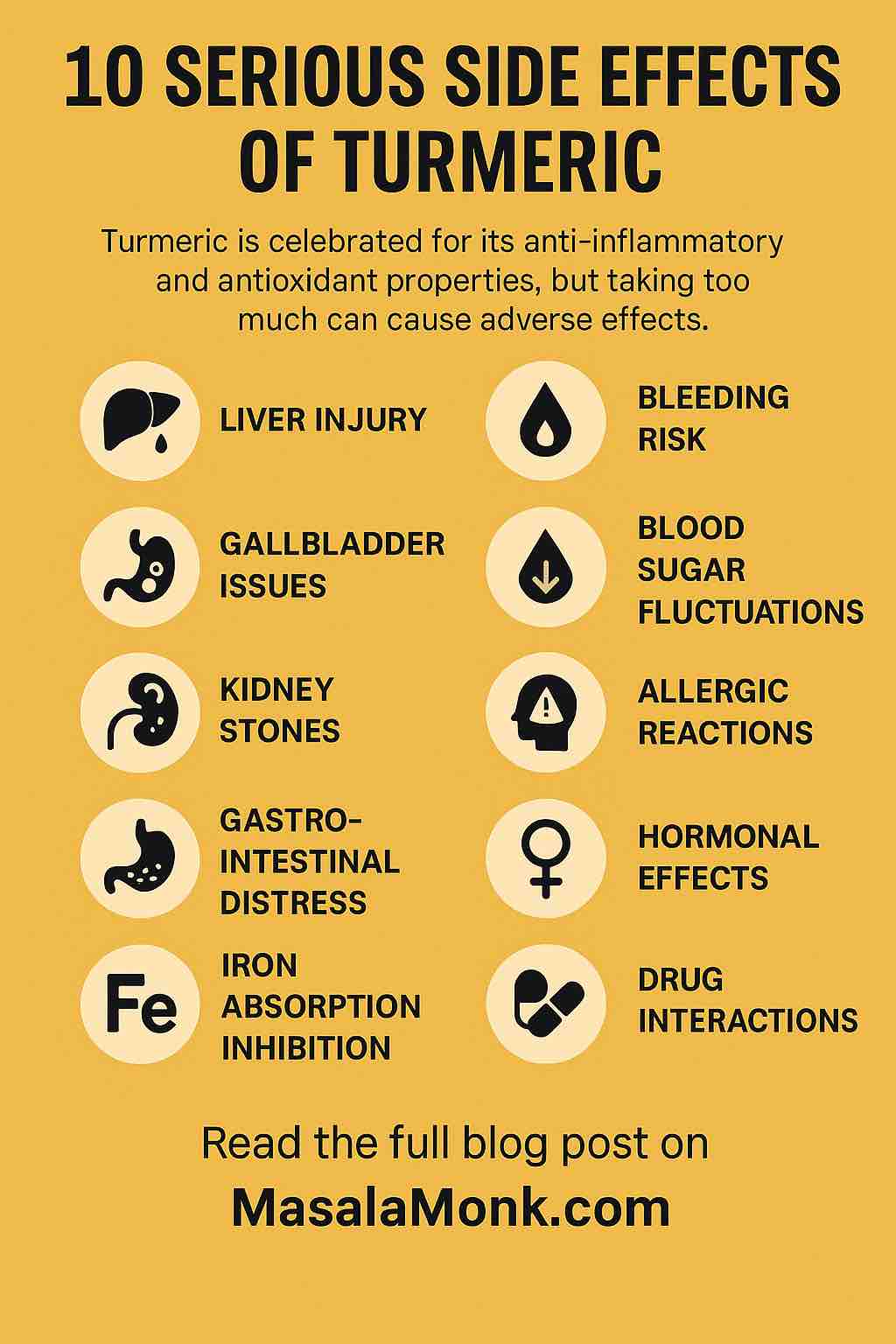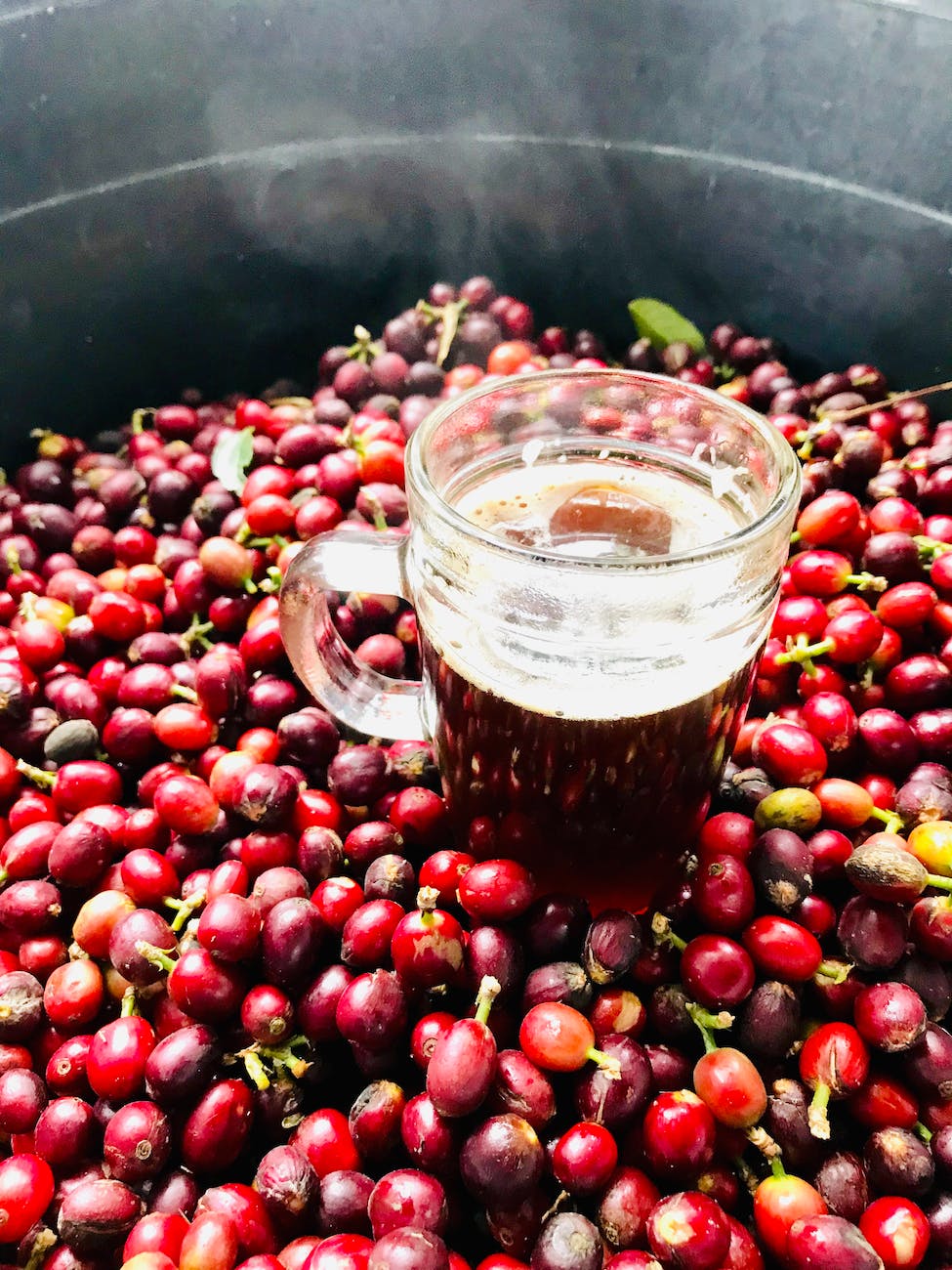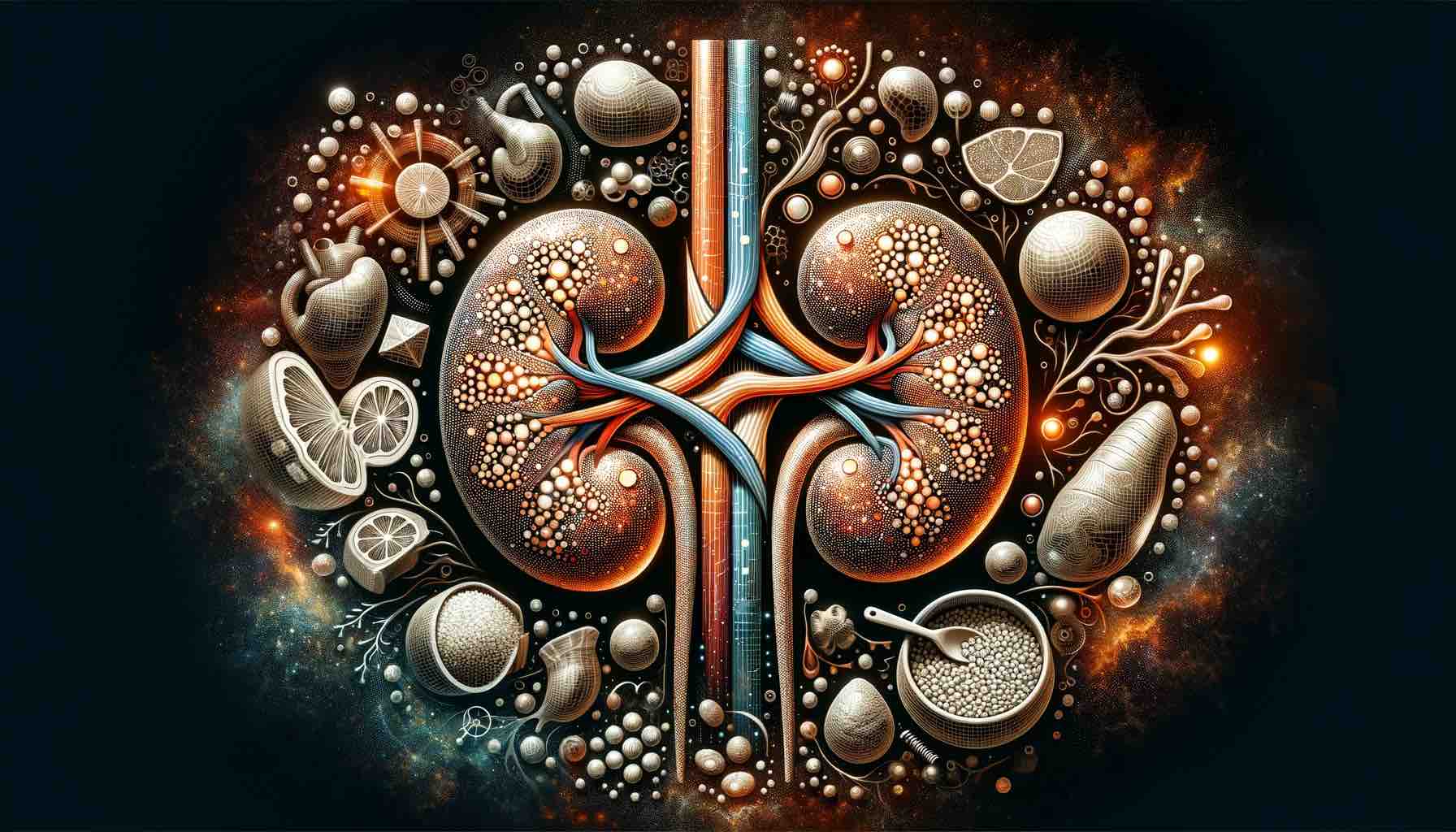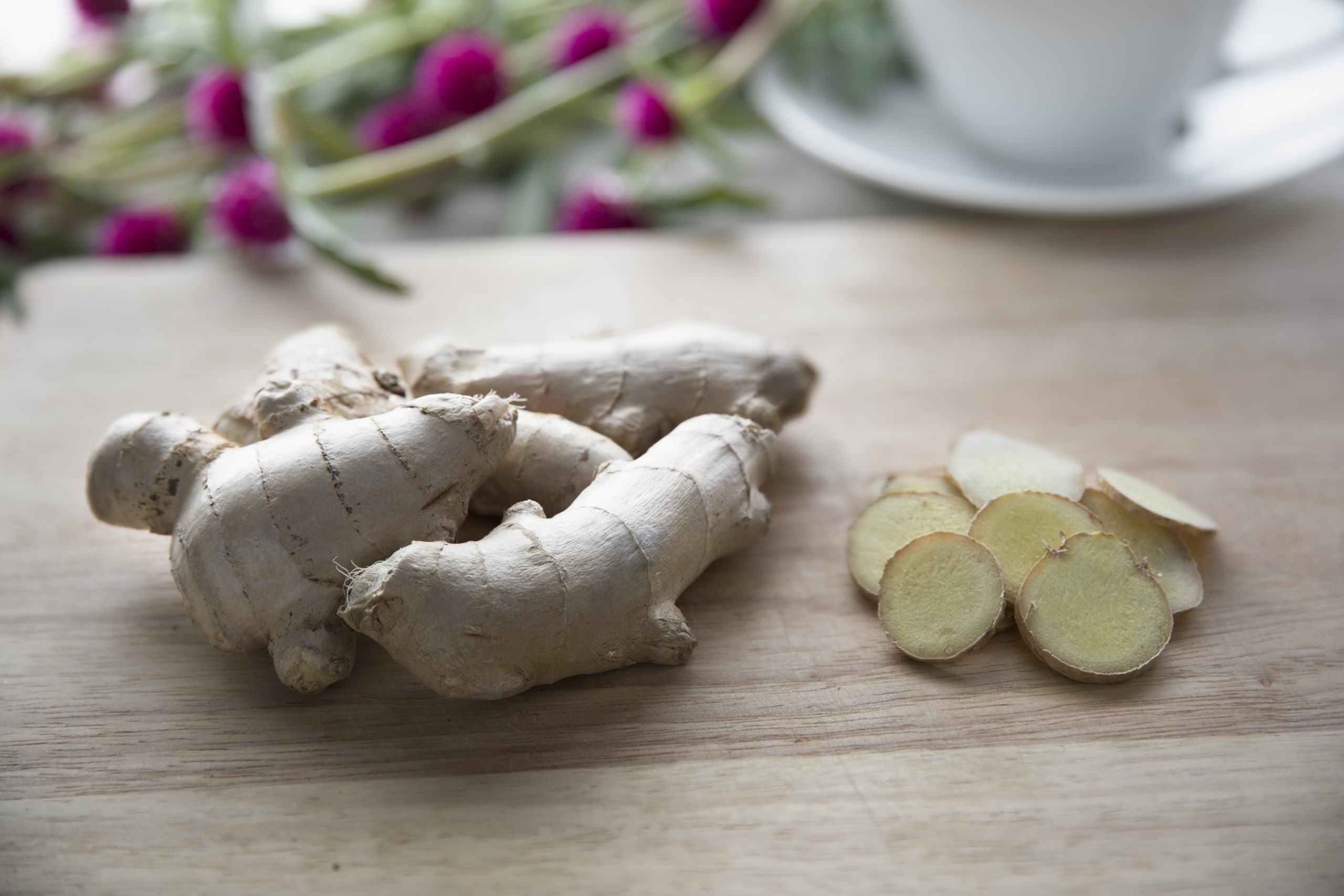
Turmeric has taken the health and wellness world by storm. From golden lattes to supplements lining pharmacy shelves, this vibrant yellow spice is celebrated for its powerful anti-inflammatory and antioxidant properties, largely thanks to its star compound: curcumin.
But is turmeric truly the miracle root it’s touted to be? Like all powerful natural remedies, turmeric comes with its own list of risks — especially when taken in large doses or as a concentrated supplement.
If you’re sprinkling it liberally over your food, chugging it down as tea, or popping curcumin capsules daily, it’s time to learn about 10 serious side effects of turmeric you should not ignore.
1. Liver Damage: The Hidden Risk in Supplements
While turmeric in food amounts is generally safe, turmeric supplements have been increasingly associated with liver injury. In fact, studies have identified multiple cases of hepatotoxicity (liver toxicity), including elevated liver enzymes and jaundice, directly linked to high-dose curcumin supplements.
Italy has even banned health claims on turmeric supplements due to liver safety concerns.
If you have a history of liver conditions or are taking medications that affect the liver, consult a doctor before starting turmeric supplements.
2. Increased Bleeding Risk
Curcumin has blood-thinning properties, which may increase the risk of bleeding, especially when combined with anticoagulant or antiplatelet medications like aspirin, warfarin, or clopidogrel.
Even something as simple as a minor injury could become a bigger issue if your blood doesn’t clot effectively.
If you’re preparing for surgery, doctors typically recommend stopping turmeric supplements at least two weeks beforehand.
3. Gallbladder Contractions and Gallstone Pain
Turmeric stimulates bile production — a benefit for digestion — but a problem for people with gallbladder issues.
If you have gallstones or bile duct obstruction, turmeric may trigger painful contractions or exacerbate existing symptoms.
Stick to small, food-based amounts, and avoid turmeric supplements if you’ve ever been diagnosed with gallstones unless cleared by your physician.
4. Formation of Kidney Stones
Turmeric contains oxalates, which can bind with calcium and form insoluble calcium oxalate — a primary component of kidney stones.
One tablespoon of turmeric powder can contain up to 60 milligrams of oxalates.
If you are prone to kidney stones, especially calcium oxalate stones, consider reducing your turmeric intake or switching to low-oxalate alternatives.
5. Digestive Distress
Ironically, while turmeric is often recommended for digestive health, it can cause gastrointestinal issues in high doses, including:
- Nausea
- Diarrhea
- Acid reflux
- Bloating
This is particularly true with concentrated supplements, which can irritate the gastrointestinal lining.
6. Iron Absorption Interference
Turmeric may reduce the body’s ability to absorb iron, increasing the risk of iron deficiency anemia in some individuals.
This is especially concerning for vegetarians, menstruating women, and people with pre-existing anemia.
If you’re relying on dietary iron or iron supplements, be mindful of turmeric’s potential to block non-heme iron absorption.
7. Blood Sugar Crashes
Turmeric is known to lower blood sugar levels — which can be beneficial for those with insulin resistance. However, when combined with diabetic medications, the effect can be too strong, leading to hypoglycemia (low blood sugar).
Symptoms may include dizziness, confusion, shaking, and even fainting.
If you’re diabetic, closely monitor your blood sugar levels when introducing turmeric supplements.
8. Allergic Reactions
Though rare, turmeric can trigger allergic reactions, ranging from skin rashes and hives to more severe responses like shortness of breath or anaphylaxis.
Individuals allergic to ginger or yellow food dyes (especially tartrazine) may be more prone to turmeric allergies.
Always test new supplements in small amounts, especially if you have a history of sensitivities or allergies.
9. Hormonal Effects and Cancer Risk
Curcumin may act as a phytoestrogen, mimicking the hormone estrogen. This can pose risks for individuals with hormone-sensitive conditions, including:
- Breast cancer
- Ovarian cancer
- Uterine fibroids
- Endometriosis
While some lab studies suggest anti-cancer benefits, others raise caution about curcumin’s hormonal effects in susceptible individuals.
Always speak to a healthcare provider before using turmeric therapeutically if you have a hormone-sensitive condition.
10. Dangerous Drug Interactions
Curcumin affects liver enzymes that are crucial for drug metabolism. This can either enhance or inhibit the action of various medications, including:
- Antidepressants
- Antibiotics
- Chemotherapy drugs
- Immunosuppressants
The result? Medications may become less effective — or dangerously potent.
Drug interactions may not be noticeable right away, but over time, they can cause serious complications.
Should You Stop Using Turmeric?
Not necessarily. Turmeric, when used appropriately — particularly in cooking — remains a powerful health ally. But dose and context matter.
Safety Tips:
- ✅ Stick to food-level doses unless advised otherwise.
- ✅ Avoid turmeric supplements if you’re on blood thinners, diabetic medications, or chemotherapy.
- ✅ Consult your doctor if you have liver, kidney, or gallbladder issues.
- ✅ Don’t use turmeric supplements during pregnancy or while breastfeeding.
- ✅ Always purchase turmeric supplements from reputable sources to avoid contamination and adulteration.
Final Thoughts
Turmeric is a potent plant with a long history of medicinal use, but natural doesn’t always mean safe — especially in concentrated or supplement form. As with any health product, the benefits must be weighed against the potential risks.
Think of turmeric as a strong spice with therapeutic potential — but not a cure-all. Used wisely, it can be part of a healthy lifestyle. Overused or misunderstood, it can lead to complications that outweigh its benefits.
🔍 Have you experienced any side effects from turmeric? Let us know in the comments below — and don’t forget to share this article with anyone who might be overdoing their turmeric game!
FAQs: Turmeric Side Effects and Safe Use
1. Is turmeric safe to take every day?
Yes, turmeric is generally safe in culinary amounts when used in food daily. However, taking high-dose supplements every day can pose risks such as liver damage, digestive issues, or drug interactions.
2. What is a safe daily dose of turmeric or curcumin?
For general health, up to 500–2,000 mg of curcumin per day is considered safe for most people when taken short-term. However, consult a doctor for appropriate dosing, especially if you’re using supplements.
3. Can turmeric cause liver problems?
Yes. Though rare, turmeric supplements have been linked to liver toxicity, especially in people with pre-existing liver conditions or those using high doses long-term.
4. Who should avoid turmeric?
People with the following conditions should avoid turmeric or seek medical advice:
- Gallstones or bile duct obstruction
- Liver disease
- Bleeding disorders
- Iron deficiency
- Hormone-sensitive cancers
- Pregnant or breastfeeding women
- Individuals on medications for diabetes, blood pressure, or depression
5. Does turmeric interfere with medications?
Yes. Turmeric, especially curcumin, can interact with:
- Blood thinners (e.g., warfarin)
- Antidiabetic drugs
- Antidepressants
- Chemotherapy agents
- Antacids and antibiotics
Always consult your healthcare provider before combining turmeric with medications.
6. Can turmeric help with inflammation without causing side effects?
Turmeric can reduce inflammation when used in moderate dietary amounts. For therapeutic use, it’s best to follow professional guidance to avoid side effects from high doses.
7. Is turmeric bad for the kidneys?
Turmeric contains oxalates, which can promote kidney stone formation in susceptible individuals. If you’re prone to kidney stones, limit turmeric intake and consult a doctor.
8. Does turmeric affect hormonal balance?
Yes. Turmeric (curcumin) may have estrogen-like effects, which can potentially worsen hormone-sensitive conditions such as breast or uterine cancer. Use cautiously and under medical supervision if you have such conditions.
9. Can I take turmeric with food to reduce side effects?
Yes. Consuming turmeric with food can improve absorption and reduce gastrointestinal discomfort. It’s also better absorbed when combined with black pepper (piperine) and healthy fats.
10. What are signs I might be reacting badly to turmeric?
Watch out for symptoms such as:
- Nausea or upset stomach
- Skin rashes or itching
- Yellowing of the skin (jaundice)
- Dizziness or low blood sugar symptoms
- Bleeding or bruising easily
If you notice any of these, stop use and consult a healthcare provider.













